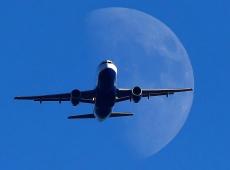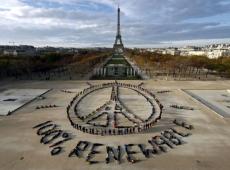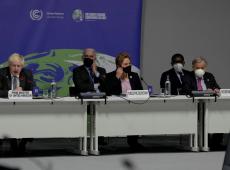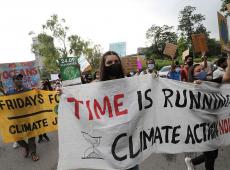Air New Zealand Drops 2030 Emissions Goal: Costs, Solutions Scarce
By Rediff Money Desk, Wellington Jul 30, 2024 15:34
Air New Zealand scraps its 2030 carbon emission targets due to high costs and limited solutions, highlighting challenges for airlines and policymakers in reducing aviation emissions.

Wellington (New Zealand), Jul 30 (AP) Air New Zealand scrapped its 2030 carbon emissions reduction targets on Tuesday, citing lags in producing new planes, a lack of alternative fuel and challenging regulatory and policy settings.
The move by the national carrier one of New Zealand's biggest companies by revenue was the highest-profile reversal yet of an airline's commitments to a UN framework for corporations to stay on track to meet the Paris Agreement on emissions reductions, highlighting the hurdles facing carriers and policymakers in cutting aviation emissions.
Tuesday's update was a sharp turnaround from a 2022 announcement by Air New Zealand in which it declared itself the second carrier in the world to have its plans validated by the UN's Science Based Targets Initiative aviation framework. It pledged a 28.9 per cent reduction in carbon emissions 2030, from a 2019 baseline, with a 16.3per cent drop in absolute emissions.
The airline which was led until 2019 by the now-Prime Minister of New Zealand, Christopher Luxon was due to begin progress reports on its 2030 emissions targets during this financial year.
Air New Zealand said it was still committed to a target of net zero carbon emissions by 2050, in line with the Paris Agreement. The carrier would establish new near-term emissions reduction targets that would better reflect the challenges relating to aircraft and alternative jet fuel availability, CEO Greg Foran said in a written statement.
The airline declined an interview request from The Associated Press.
Global manufacturing and supply chain issues could slow the introduction of more fuel-efficient planes into Air New Zealand's fleet, Foran said. The affordability and availability of alternative jet fuels and global and domestic policy settings are also outside the airline's direct control, he added.
His remarks echoed problems facing the aviation sector worldwide. Air travel makes up about 2.5 per cent of global carbon emissions, but it's one of the most carbon-intensive activities per passenger. Production of more efficient planes is behind schedule and improvements in reducing fuel burn are agonizingly slow.
It's meant to be a very difficult target to meet but I think one that needs to be there to show everyone what needs to be done, said Sola Zheng, a senior researcher with the International Council on Clean Transportation who was involved in devising the SBTi.
The goal was a stringent one unless airlines are willing to slow down their growth, Zheng said.
Other airlines listed on the SBTi database as having removed their commitment to near-term emissions goals included United Airlines, the German carrier Lufthansa, Britain's easyJet, LATAM Airlines Chile and Japan Airlines.
Analysts have long warned that the volume of sustainable fuel being produced is a small fraction of demand.
There's not a lot of incentives for more efficient flights and increased efficiency is usually coming from more efficient aircraft models, rather than alternative fuels, Zheng said.
In Tuesday's statement, the airline's chair, Dame Therese Walsh, said the carrier would renew its advocacy for the global and domestic regulatory and policy settings" that would help the aviation sector "do its part to mitigate climate change risks.
Air New Zealand's declaration was a reminder of the challenges and of the need to lean in and help companies "do it," Australia's Minister for Climate Change and Energy Chris Bowen told reporters after meeting with his New Zealand counterpart in Brisbane Tuesday, unrelated to the airline's announcement.
Nobody ever suggested it was easy, Bowen said. What it does do is underline the needs for governments to be involved.
Tourism is New Zealand's second-largest export earner, driven by images of the country's pristine and scenic vistas. Air New Zealand's marketing efforts have often aligned with strategies to sell the country's clean and green profile abroad including in in-flight safety videos with themes of environmental stewardship.
The move by the national carrier one of New Zealand's biggest companies by revenue was the highest-profile reversal yet of an airline's commitments to a UN framework for corporations to stay on track to meet the Paris Agreement on emissions reductions, highlighting the hurdles facing carriers and policymakers in cutting aviation emissions.
Tuesday's update was a sharp turnaround from a 2022 announcement by Air New Zealand in which it declared itself the second carrier in the world to have its plans validated by the UN's Science Based Targets Initiative aviation framework. It pledged a 28.9 per cent reduction in carbon emissions 2030, from a 2019 baseline, with a 16.3per cent drop in absolute emissions.
The airline which was led until 2019 by the now-Prime Minister of New Zealand, Christopher Luxon was due to begin progress reports on its 2030 emissions targets during this financial year.
Air New Zealand said it was still committed to a target of net zero carbon emissions by 2050, in line with the Paris Agreement. The carrier would establish new near-term emissions reduction targets that would better reflect the challenges relating to aircraft and alternative jet fuel availability, CEO Greg Foran said in a written statement.
The airline declined an interview request from The Associated Press.
Global manufacturing and supply chain issues could slow the introduction of more fuel-efficient planes into Air New Zealand's fleet, Foran said. The affordability and availability of alternative jet fuels and global and domestic policy settings are also outside the airline's direct control, he added.
His remarks echoed problems facing the aviation sector worldwide. Air travel makes up about 2.5 per cent of global carbon emissions, but it's one of the most carbon-intensive activities per passenger. Production of more efficient planes is behind schedule and improvements in reducing fuel burn are agonizingly slow.
It's meant to be a very difficult target to meet but I think one that needs to be there to show everyone what needs to be done, said Sola Zheng, a senior researcher with the International Council on Clean Transportation who was involved in devising the SBTi.
The goal was a stringent one unless airlines are willing to slow down their growth, Zheng said.
Other airlines listed on the SBTi database as having removed their commitment to near-term emissions goals included United Airlines, the German carrier Lufthansa, Britain's easyJet, LATAM Airlines Chile and Japan Airlines.
Analysts have long warned that the volume of sustainable fuel being produced is a small fraction of demand.
There's not a lot of incentives for more efficient flights and increased efficiency is usually coming from more efficient aircraft models, rather than alternative fuels, Zheng said.
In Tuesday's statement, the airline's chair, Dame Therese Walsh, said the carrier would renew its advocacy for the global and domestic regulatory and policy settings" that would help the aviation sector "do its part to mitigate climate change risks.
Air New Zealand's declaration was a reminder of the challenges and of the need to lean in and help companies "do it," Australia's Minister for Climate Change and Energy Chris Bowen told reporters after meeting with his New Zealand counterpart in Brisbane Tuesday, unrelated to the airline's announcement.
Nobody ever suggested it was easy, Bowen said. What it does do is underline the needs for governments to be involved.
Tourism is New Zealand's second-largest export earner, driven by images of the country's pristine and scenic vistas. Air New Zealand's marketing efforts have often aligned with strategies to sell the country's clean and green profile abroad including in in-flight safety videos with themes of environmental stewardship.
Source: ASSOCIATED PRESS
Read More On:
DISCLAIMER - This article is from a syndicated feed. The original source is responsible for accuracy, views & content ownership. Views expressed may not reflect those of rediff.com India Limited.
You May Like To Read
TODAY'S MOST TRADED COMPANIES
- Company Name
- Price
- Volume
- GTL Infrastructure
- 2.95 ( -1.67)
- 85124590
- PNB Housing Finance
- 779.35 ( -1.87)
- 34851127
- Alstone Textiles
- 0.83 ( -1.19)
- 27125424
- Vodafone Idea L
- 16.22 (+ 1.00)
- 24790054
- AvanceTechnologies
- 0.91 ( -3.19)
- 24195837
MORE NEWS

BRICS Trade Ministers' Meeting: Global Supply...
South Africa's Deputy Minister for Trade, Industry and Competition warns of global...

Indus Towers Q1 Profit Soars 42% to Rs 1,926 Cr
Indus Towers reported a 42% jump in consolidated profit to Rs 1,926 crore in the first...
Hexaware Opens New Delivery Center in Manila
Hexaware Technologies expands its presence in the Philippines with a new delivery...












 © 2024 Rediff.com India Limited. All rights reserved.
© 2024 Rediff.com India Limited. All rights reserved.